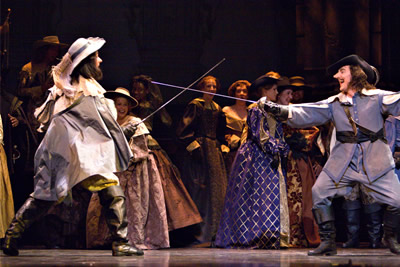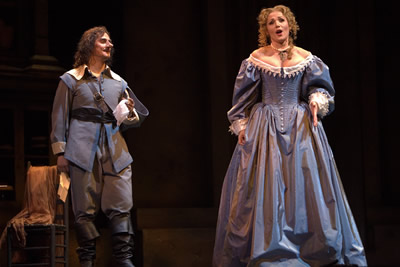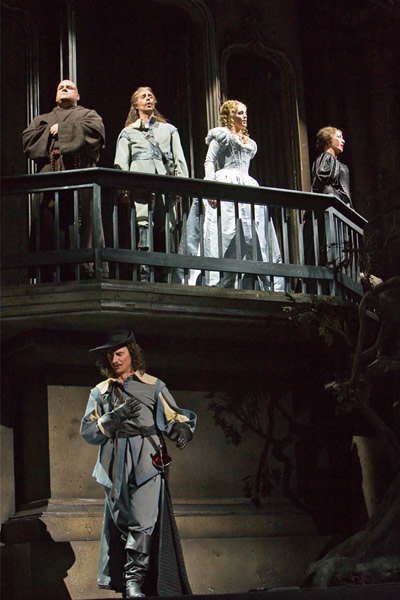“Cyrano”: A Romantic Opera
Which Begs for the Classical
By Susan W. Bowen
October 2007
 |
| John Grigaitis. Matthew Hayward as Marquis de Brisaille and Marian Pop as Cyrano. |
The world premiere of the new Opera, “Cyrano”, opened the 2007 Season at the Michigan Opera Theater (MOT) to a wildly enthusiastic audience, bringing to the Midwest extraordinary voices, superb acting, and fabulous staging. This new opera, sung in French with English subtitles, was composed by the current, beloved impresario of the MOT, Dr. David Di Chiera, the libretto is by Bernard Uzan, who also directed the performance, and costumes and set design were done by John Pasco. “Cyrano” is an adaption of Edmond Rostand's 1897 play about the real life poet, writer and soldier Cyrano de Bergerac, 1619-1655. Rostand's well known drama has been adapted for the stage, film and opera many times over the years in both French and English. The opera will be performed in Philadelphia and Florida over the next year.
The standing ovations and sustained applause from the audience, as well as the rave reviews from the critics, tend to indicate that this world premiere is a wonderful success, with a new Romantic opera added to the repertoire. But from the standpoint of a different measure, namely, the classical principle of musical counterpoint, the opera, though rich in poetic and dramatic ironies, did not succeed, leaving the good intention to continue the classical tradition of opera yet unrealized in “Cyrano”.
Given that the essence of a truly classical work is that it is heard in mind, and not in the senses, the lack of musical counterpoint in “Cyrano” was frustrating. In classical composition, a new idea forms in the mind, as two or more voices sing different lines, often counterposing different ideas or thoughts, or the same idea from different standpoints at the same time, allowing a lawful irony to develop, and be resolved.
The great works of classical opera, especially those of Mozart and the Italian bel canto school, represented a great advance, based on this development of polyphonic counterpoint. It allows the characters to "come to life," while, at the same time, it permits the composers more freedom to introduce sometimes-conflicting views to be presented simultaneously. The effect is to deepen the "subtext" of the work, while stretching the concentration span of the audience.
The absence of this level of counterpoint in the overall orchestration of “Cyrano” (Mark Flint, conductor and orchestrator) thus undercut the potential that is demonstrated in the production. It had a very "20th century" sound, somewhat like movie music, often playing too loud to hear the singing in the middle ranges of the singers. “Cyrano” does have some beautiful melodies and startling transitions, mixed with humor and dramatic shifts, woven throughout the three acts of this romantic opera. And like some Verismo operas, “Cyrano” is vocally demanding, with sensational vocal leaps, sustained and pianissimo high notes, held basso low notes which must be heard over the often-too-loud orchestra, shifts in dynamics, and more. But in each scene, we were left with a sense of unfulfilled anticipation for some further musical development to "complete the idea," which never came forth. There was only one quintet in “Cyrano”, which was an attempt at that polyphonic idea; the large choruses and ensemble pieces were staged and choreographed extremely well, but, as above, they begged for "more" from the score.
 |
| John Grigaitis. Marian Pop as Cyrano and Leah Partridge as Roxane. |
A clear example of this problem can be seen in the first duet between Roxanne and Cyrano in the opening of the second scene, where the dramatic tension increased, but the musical tension did not. Cyrano (Marion Pop, baritone) is the creative poet and best swordsman of the cadets, but whose grotesquely large nose prevents him from ever hoping for a woman's love. The opera opens as the townsfolk gather in the theater for a performance by a famed actor, Montfleury (Jason Budd, speaking), including the beautiful Roxane, (Leah Partridge, soprano), a "precieuse" (a reference to the aristocratic intellectual women of the mid 1600s) who is loved/desired by the Marquis De Guiche, Richelieu's powerful nephew (Peter Volpe, bass), and also Christian (Jose Luis Sola, tenor), a very handsome new recruit to the cadets. Secretly, Cyrano, Roxanne's cousin, loves her also. Christian leaves to alert Lignere after he is warned by a messenger (Daniel Okulitc, bass-baritone) of a planned assasination the cadet. Ligniere, (Alan Coulombe, bass) was targetted for his satirical poem against De Guiche's boss. Cyrano arrives and runs the actor off the stage, wins a duel with words and sword against the Marquis de Brasille (Matthew Hayward, baritone), and after the crowd leaves, Roxane's duenna (Gloria Parker, mezzo soprano) requests a private meeting between Roxane and Cyrano.
Cyrano's friend Le Bret (Gaetan Laperriere, baritone), convinced him to confess all to Roxane, which he prepares to do, interrupted only by having to thwart the assassination threat against his friend. Cyrano takes on the 100 men alone, and invites the others to watch.
Scene 2 opens in the pastry shop of Ragueneau the baker (Eric Johnston, tenor), who was also in the tavern earlier, as Cyrano is writing the verse he is to deliver to the backdrop of a delightful scene where the workers sing an ode, and present Ragueneau with a brioche baked in the shape of a lyre. The baker is also a poet, and his shop is the meeting place for the poets and writers. After the cooks are sent away, Cyrano and Roxane have their meeting. Roxanne represents, according to the program notes, somewhat of an intellectual, who spoke of ideas and profound love. However, it is evident to all that she actually falls for Christian because he is so extremely handsome and appealing to the eye.
 |
| John Grigaitis. Torrance Blaisdell as Capucin, Jose Luis Sola as Christian, Leah Partridge as Roxane and Gloria Parker as La Duenna and Marian Pop as Cyrano below. |
The tension builds as the cousins recount the childhood they spent together years ago, and as Roxanne tells her thoughts, how she loves someone who doesn't know it, Cyrano gets more and more confident that she is talking about him. However, she confesses love for Christian, and requests Cyrano's protection for him, to which Cyrano sadly agrees. In this duet, the lovely irony of having Cyrano, the master of verse, sing only the word "ah" in the dialogue, is effective as the tension increases, but the burst of contrapuntal power that is begging to come out does not come forth, so the audience is left to admire the loveliness of the voices, without the corresponding musical depth necessary to move the soul.
With turns in the plot, Roxanne and Christian marry, but the cadets are sent to war moments after the hasty wedding, with the various thoughts sung in the quintet mentioned above, where the very high pitched Capucin blesses them, Cyrano sings that he has lost Roxane, but he is hers forever, Roxane sings of her love for Christian, his beauty and wit, the Duenna asks God's blessings, and Christian sings how he loves her, but dares not speak to her because he has no wit.
The intention of the opera's creators is to convey the platonic idea of love within the tragic irony of the plot; Cyrano's physical ugliness, which is only the shell for his underlying beauty and real self, is contrasted with the shallowness of Christian, whose verses to Roxane are ghost written by Cyrano, right down to the farewell letter which Roxanne picks up from the mortally wounded Christian at the war front; she only learns 14 years later, as Cyrano dies, of his authorship and love, and she laments that she loved only one soul, whom she lost twice.
Granted, it may be unfair to expect a new work by a modern composer to be the equal of a Mozart or Beethoven opera, especially in our culture, where people can barely distinguish classical music from television commercials. However, it IS reasonable to demand that today's composers rediscover the classical scientific principles of beauty, as developed in the musical counterpoint of Johann Sebastian Bach and elaborated by the classical composers of the 18th and 19th century through to Verdi and Brahms, because humanity desperately needs more new, beautiful, classical operas to nourish the soul in these difficult times.
Related pages:
Education. Science and Poetry Page
